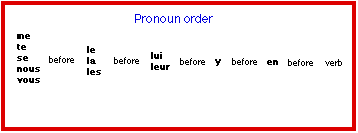Back to INDEX
- Direct object pronouns
- Indirect object pronouns
- Reflexive pronouns
- Y and en
- Multiple object pronouns (pronoun order)
Direct object pronouns. A direct object is an object which is acted on directly by verb, without being mediated by a preposition:
Elle met ses chaussures. (She puts on her shoes.)
Il a cassé le vase. (He broke the vase.)
Direct objects can be replaced by direct object pronouns (me, te, le, la, nous, vous, les), which will agree in number and gender with the noun they replace. Direct object pronouns precede the verb in all sentences except affirmative imperatives.
Elle les met. (She puts them on.)
Nous l'avons envoyé. (We sent it.)
Je ne les ai pas vus. (I didn't see them.)
Ils m'ont appelé. (They called me.)
The reflexive pronouns (me, te, se, nous, vous) are often direct object pronouns, depending on the verb with which they are used:
Elle s'est coupée. (She cut herself.)
Je me suis réveillé. (I woke up.)
(For more information, see Present tense indicative -- formation, Past participle -- agreement.)
Indirect object pronouns. An indirect object is an object of the preposition à:
Je parlais à la vendeuse. (I was speaking to the salesperson.)
Il jouait au foot. (He was playing soccer.)
In the case of a reflexive / reciprocal verb, the indirect object pronoun reflects the form of the subject:
Je me suis fait un cadeau. (I gave myself a present.)
Elle s'est dit qu'il était temps. (She told herself it was time.)
Most indirect objects can be replaced by an indirect object pronoun (me, te, se, lui, nous, vous, leur, y). Y is used as a third person pronoun to take the place of things or abstract situations. (See Y and en.) Se is used only with reflexives and reciprocals. Indirect object pronouns precede the verb in all sentences except affirmative imperatives.
Mes parents sont venus; je leur ai parlé pendant une heure. (My parents came by; I spoke to them for an hour.)
Le prof m'a posé une question, et je lui ai répondu. (The prof asked me a question, and I answered him.)
Ils nous ont envoyé un colis. (They sent a package to us / They sent us a package.)
Le prof m'a posé une question, et je y ai répondu. (The prof asked me a question, and I answered it.)
Elles se sont écrit pendant tout l'été. (They wrote each other during the whole summer.)
Note that the expressions être à, penser à, faire attention à, as well as any pronominal verb followed by à, will be followed by a disjunctive pronoun. (See Disjunctive pronouns.)
Note that past participles never agree with indirect object or indirect object pronouns. See Past participle -- agreement.
Y and en. The pronoun y can also replace the object of a number of prepositions indicating placement in space or movement:
Le livre est sur la table. ---> Le livre y est.
Je vais à la bibliothèque. ---> J'y vais.
Elle part en France. ---> Elle y va.
The pronoun en can replace the object of the preposition de, including expressions of quantity.
J'ai quatre livres. ---> J'en ai quatre.
As-tu besoin d'argent? ---> En as-tu besoin?
Elle parle tout le temps de son travail. ---> Elle en parle tout le temps.
Nous avons assez de lecture pour ce soir. ---> Nous en avons assez pour ce soir.
Note that when the object of the preposition is a person, en is generally not used; in this case the disjunctive pronoun is preferred (see Disjunctive pronouns):
Elle parle de ses frères. ---> Elle parle d'eux
Reflexive pronouns. Reflexive pronouns (me, te, se, nous, vous) are used with reciprocal and reflexive verbs, and with certain pronominal verbs. They agree in person with the subject of the verb (that is, je is followed by me, tu by te, etc.). They may be either direct or indirect objects, depending on the verbs with which they are used. For example:
Reciprocal: Elles se sont envoyé des cadeaux. (They sent each other gifts.)
Reflexive: Je me suis perdue en ville. (I got lost in town.)
Pronominal: Vous moquez-vous de moi? (Are you making fun of me?)
See Direct object pronouns and Indirect object pronouns, and see Reflexives -- present tense, and Past participle -- agreement for more information.
Multiple pronouns. Frequently one may find multiple pronouns (usually no more than two) in a sentence. The rules for placement of the pronouns are as follows:
1. In all sentences but the affirmative imperative, the order is as:

So,
Je le lui ai dit! (I told her so!)
Il m'en a parlé plusieurs fois. (He spoke to me about it several times.)
Ne nous le dis pas! (Don't tell us that!)
2. In the affirmative imperative, the order is:

So,
Donne-le-moi! (Give it to me!)
Allez-vous-en! (Get out of here!)
3. If there are multiple verbs in a clause, the object pronouns generally precede the last verb in the sequence:
Elle ne voulait pas le lui donner. (She didn't want to give it to him.)
Je ne pensais pas pouvoir le faire. (I didn't think I could do it.)
Exception: causative constructions with faire:
Ils l'ont fait construire. (They had it built)